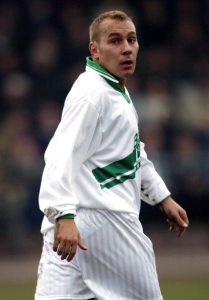
Bradford (Park Avenue)’s 2003 FA Cup First Round tie with Bristol City remains a hugely significant milestone as it marked the club’s return to the national stage for the first time since reformation in 1988.
Avenue had worked its way up from the West Riding County Amateur League to the NPL Premier Division – then only one promotion away from the Conference National.
But they had never got past the fourth qualifying round of the FA Cup and the club was desperate to see them progress into prestigious round.
The former Football League club folded in 1974 with a glorious history mixed with famous footballers who spent time in Bradford and a rich FA Cup history which included a giant-killing act over Arsenal in 1948 and a three-game battle with Manchester United in 1949.
In 2003, belief was high that Avenue could return to the League. Under Trevor Storton, appointed in 1996, Avenue had won the old NPL Division One title in 2001, reached the NPL League Cup final in 2002 and gone toe-to-toe with eventual champions Accrington Stanley for half of the season prior to Bristol City’s visit.
His team of many talents had done so well, but the missing accolade was a FA Cup First Round proper appearance. That changed once as Chester Le-Street, Vauxhall Motors and finally Runcorn FC Halton were beaten in the qualifying rounds, setting up a tie with League One Bristol.
The Sunday game attended by over 2000 people at Horsfall Stadium, and whilst it made many of the older Avenue fans’ dreams come true, it acted as the final major battle of the great Storton era and retrospectively a fitting swansong for a few of the players who had delivered huge success for Avenue.
Wayne Benn and Andy Hayward left separately within months and Storton himself departed by mutual consent in the March of 2004.
The captain of Avenue in the Bristol game was Benn, who made over 250 appearances over eight years in his first spell and later returned briefly as a player and then as the reserve team manager in 2009, and he re-lives the famous Cup tie in the latest ‘My Greatest Game’.
The current Ossett Untied manager also discusses his deep affection for Avenue, the relationship between the fans and players and why Storton’s team were so successful.
Bradford (Park Avenue) (Andy Hayward 5, Danny Coles OG 13) 2-5 Bristol City (Kevin Amankwaah 7,9, James Stansfield OG 54, Luke Wilkshire 66), Lee Matthews 82) – Sunday 9th November 2003
The Teams
Bradford (Park Avenue): Matthew Boswell, Carl Serrant, Ryan Crossley, Simon Collins (Craig Smith 81), James Stansfield, Graham Mitchell, Steve Oleksewycz (Andy Wright 81), Wayne Benn (captain), Andy Hayward, Jason Maxwell, Nicky Wood (Danny Walsh 85). Subs unused: Andy Quinn, Richard Tracey.
Bristol City: Steve Phillips, Kevin Amankwaah, Tony Butler, Danny Coles, Matthew Hill, Craig Woodman, Luke Wilkshire (Simon Clist 86), Joe Burnell (captain), Aaron Brown (Leroy Lita 86), Lee Peacock, Christian Roberts (Lee Matthews 73). Subs unused: Mike Stowell, Clayton Fortune.
Referee: M S Pike (Barrow-In-Furness)
Attendance: 2,045
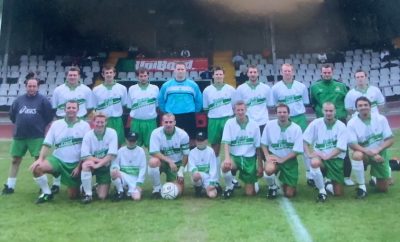
“Although the club did not throw money around, it always matched my ambitions and if the side that had won the league (in 2001) had stayed together for longer, I genuinely think we could have put the club in the Conference. This was before the restructure when the NPL Premier Division was below the Conference National. We had a really good side and it was a gradual progression over time and we got ourselves into a position where I feel if we had kept that side for longer or added that little bit more quality then we could have potentially put Bradford (Park Avenue) in the Conference and one promotion away from a return to the Football League.
“Obviously I started at Avenue with Gordon Rayner during the old Batley days (in 1995) which were pretty bleak to be honest. I only briefly played with Gordon and that came about through an end of season tour with Bradford City to Germany. Gordon was out there with the Bradford City Veterans team. He saw me play and when I got released he got in touch. He took a chance and rang me and I didn’t have anything planned at the time.
“We moved to Horsfall and that helped because we were playing on a much better surface. Horsfall isn’t everyone’s cup of tea. It didn’t always have the best atmosphere because of the running track. The running track would become the bane of our lives as players once Trevor Storton came in because it got lots of action in training. In fairness to Trev he did most of the running with us. It was nightmare at times. You’d turn up knowing that if there was a bit of frost, all you were going to do was run round. But that’s what Trevor was about. He got us fit and I think that’s what led to the success we had. It all snowballed from Trevor coming in and he was the best manager I worked under.
“We had a bit of everything (by the early 2000s). We could go toe-to-toe with people if they wanted to be physical. We could out-football any team. We had pace in good areas and we had characters in the team. We had winners. Trev and Ian Thompson brought in good characters and they put a hell of a side together. He’s one of best mates, but the signing of Andy Hayward was a big catalyst for the success we had. Coming in and scoring 37 goals in his first season was phenomenal. Without his goals, we wouldn’t have won the league – even though we would won it comfortably.
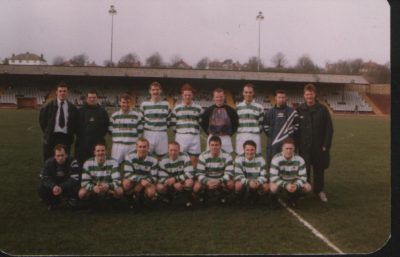
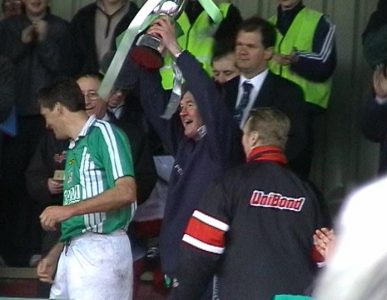
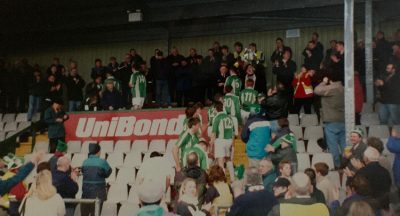
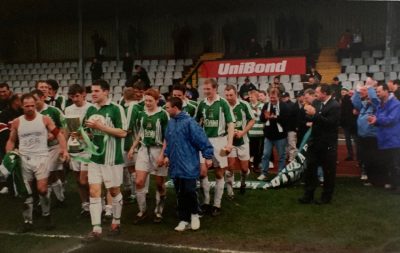
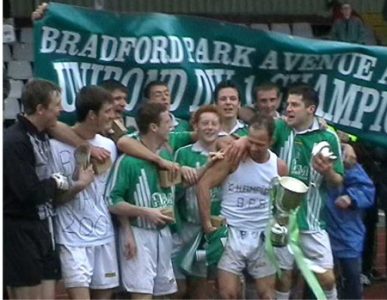
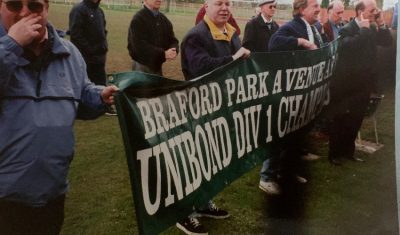
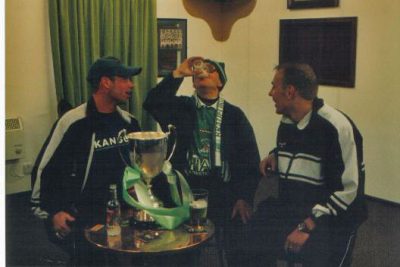
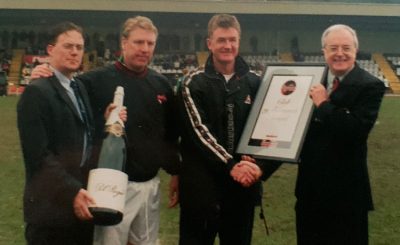
“It wasn’t just Andy. I was well-established. We had a good goalkeeper in terms of Gavin Kelly. We had solid centre-halves like Neil Bagshaw, Mickey Thompson, Neil Lacey, Paul Marquis. Martin James was experienced, so was myself and Mark Hancock. Kieran O’Brien was a quick and young full-back. We had Dean Calcutt and Rory Prendergast out-wide at one point. Then you had Jason Maxwell and Andy upfront and there wasn’t a better pairing in the Division. They were a real threat and good combination. Andy Quinn was a good lad, so was Danny Walsh who I loved playing with. Simon Collins was around too later on. Over the eight or nine years I was there in my first spell, we just had a squad full of good players.
“When it came to the season of the Bristol City game, Trevor didn’t struggle to get players in, he just had a team that had been together for two or three seasons it was beginning to break up. Maybe too soon as well. People like Hanks had long gone and for whatever reason I think the new lads struggled to gel on the field with the existing lads. In the league we struggled to get results, even though there was plenty of ability. Graham Mitchell had played at Bradford City and Huddersfield, Robbie Painter – experienced, Carl Serrant – a hell of a player and a great signing, Ryan Crossley was a great player then and obviously went onto bigger and better things, Craig Smith was young, but very talented. Steve Oleksewycz came in and he was a bit of prankster. We’d nobody like him before. We had great banter, but he took it took another level. He put deep heat in people’s shorts and after I left I heard stories of him moving people’s cars. Jason and Andy were still up top. We had the talent, but sometimes you do underachieve and that was one of those times. Looking at the team that year, we probably lacked Dean Calcutt’s pace and Rory’s pace in terms of the attacking part. James Stansfield was another solid player so I feel we had enough there to have done better than we did.
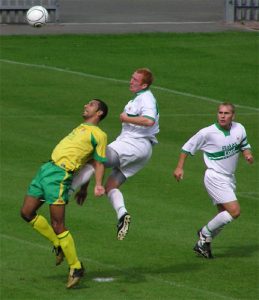
“But we did well in the FA Cup. The club had never got to the first round as a reformed club and as you get closer to realising that, you tend to get excited. Looking back we had a pretty tough run and I can remember the Runcorn game being very tight and Andy Hayward scoring. Getting there was a good achievement in itself. Then when we got Bristol City, who were one of the biggest clubs we could have got.
“The next part of the memories is the build-up. It was a long-drawn out process. I remember Sky Sports coming along and filming us train and the FA Cup trophy coming to the social club on a midweek night. Everybody had their photos taken with it. I got interviewed by John Helm on Calendar so it was a very busy period.
“The Bristol game wasn’t the biggest of my career, Non League-wise it was the biggest game I ever played in. With Bradford City I played in first team games which were obviously bigger. I remember playing at Hillsborough in a League Cup game for Bradford and there was 30,000 people there. But it was the centre-piece, the crowning achievement of my time with Avenue. It felt like that at the time. The team that had won the league was breaking up, new players were coming in and it did feel like it was a reward for the times we had been there.
“For a Non League club to get to the first round it is as good as winning a trophy. There’s the financial rewards and it is the holy grail for a lot of Non League clubs. It was unbelievable for the Avenue fans. As players you enjoy it, but those type of days are for the supporters. They had been through some tough times. The club had gone out of existence. The supporters had kept the name alive until Bob Robinson reformed the club in 1988. They had never had a proper home and although there had been an upward curve of constant progression – certainly during Trevor’s time – but they had never had proper National media coverage. The Bristol brought the club back into the spotlight and the club was able to say to the football world that ‘Bradford (Park Avenue) are back’. Until the Bristol game there would have been a lot of people who didn’t even know that the club had reformed. The success we had during Trevor’s time re-established the club as a force again. It was a great journey and I know people like Frank Thornton (the chairman during Trevor Storton’s reign) and (founder) Bob Robinson really enjoyed the ride. They were responsible for a lot of the success we had and I know they were really proud. Playing Bristol City was a massive reward for Frank and Bob, as well as the fans.
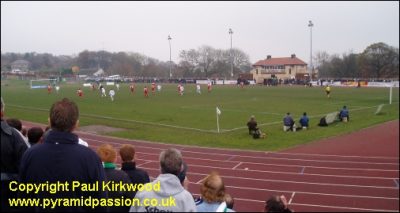
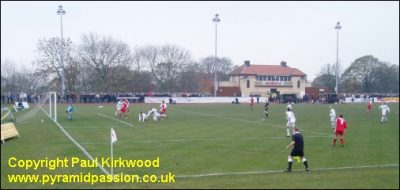
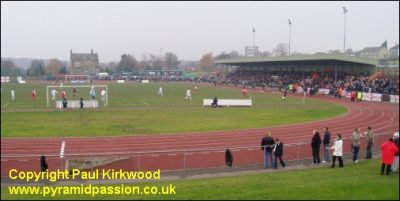
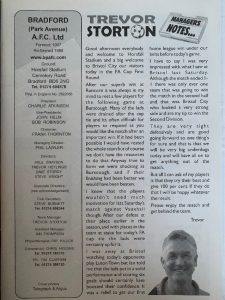
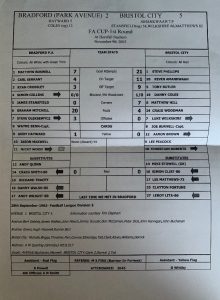
“The atmosphere was fantastic, it was electric. We had not seen that type of crowd at Horsfall ever. It could be quite a quiet place, but with 2000 people in there, naturally that brings atmosphere. Because we scored early it got people right up for the game. I remember it being really loud. There was a drum, loads of Avenue flags waved and normally you could what certain people were shouting from the side, you couldn’t on this occasion. It was also the only time I had the whole family at a game. I had 15 or 20 of my mates came as well so I had to buy loads of tickets. I was surrounded by 25 people in the bar and I think all the other lads were as well. It is not a game that happens regularly.
“From looking at the team who against Bristol I think we played 3-5-2. It was a formation that Trevor quite liked. I played as a sweeper quite a lot. The training sessions leading up to the game were about wanting to cause Bristol City problems – hence the two upfront – but to try and stay solid to stay in the game. The easiest thing to do in those games is to play 4-5-1 and you never get out of your own half and it is hard work. Trevor was stressing the fact he wanted us to have a go. He believed in us and believed in our ability to handle and pass the ball and cause them problems.
“I remember it being faster than anything we had come up against in our league. It was a furious pace, but we more than matched them in the first half. I think we defended well and were getting on the ball quite a lot. The good things with professional teams is that they’ll let you have the ball a bit. We probably surprised them with the quality we had. Up until half-time we did ever so well. We caused them problems and I remember Andy putting us ahead. I’m sure it got crossed in from the left and Andy took a touch and finished quite well. It wasn’t scruffy, but it was from close range.
“Bristol made it 2-1 to them straightaway, but we came back again. Although it went down as an own goal, one of Simon’s strengths was arriving late into the box. I don’t really recall it or Simon’s appeals after the game that it was his goal or the rumours that he started a petition to claim it, but I know it was a scruffy shot.
“At half-time you go in at 2-2 and you know you have a chance in the second half. In the end it was fitness levels that caught us out. We were in the game, we were competing all over the pitch and they weren’t looking head and shoulders above us. 5-2 flattered them. We ran out of steam and a couple of their goals were pretty soft. At 3-2 we felt we could still nick something. The ultimate would have been getting a replay and going to Bristol City and playing in front of 10,000 and the club getting a share of the goals. But two of the goals were later in the second half and it was more to do with us running out of gas.
“Trevor was really proud of everyone. We had given Bristol a scare and surprised them with our ability and quality. Trevor said himself that it was down to fitness and losing our shape because of being tired. It was a privilege to captain Avenue in such a prestigious game. Things are hazy now 17 years on, but I think I may have won man of the match? I’m not sure?
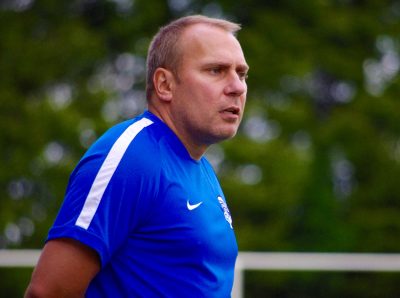
“For a few of us the Bristol City game was an end of a era. I left two months later. I had seen good players leave, the season wasn’t particularly great and I had a disagreement with Ian Thompson. I think I was a little bit foolish to leave at the time. But things happen for a reason. I moved on, Trevor moved on later and other people came in. With Trev leaving not long after me, there is a strong chance I may have moved on anyway because he was a big part of my career in general.
“Avenue was and is a fantastic club. I played with some unbelievable players and for some amazing fans. What set that club apart was the relationship between the fans, volunteers, players and the directors. Everyone was together. It was a well-run football club with really good people. When you get that, you can start to achieve things and loads of people deserve credit for the way it was run and the run of success we had over those years.
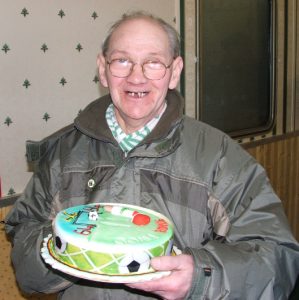
“I’m not sure you can put it into words, but I absolutely loved every minute of my time with Avenue. There was a couple of later spells, but the largest chuck was the first, eight years or so. There were some great characters behind the scenes, a great fanbase in terms of how they interacted with the players. I really enjoyed the closeness. You’d see me and others still there hours after a game had finished, talking to the fans. For me it was very special. We used to take 200 people to away games which for the league we were in at the time it was unbelievable. The away support was immense. Then there were the coach trips. When I joined the club it was the first time as a player where the supporters were on the team bus. I loved it and the lads did. We all know the stories about the characters on the coaches like your Ronnie’s, your Gilbert’s, Mad Pete and the rest of the guys. Some of them are still very active at the club now. Win, lose or draw, the atmosphere on the bus was always great. You then had people like ‘Willy’ Wilson climbing on the seats and entertaining everybody.
“The club did move away from that when Bob Blackburn was around. Bob did a hell of a lot of good stuff, but the atmosphere did change. I know a few people left the Football Club because they didn’t like the way it was going. But when everybody knows you’re splashing cash it adds pressure. At one point they were dragging a lot of Lancashire players over and I think the players and the fans did lose that connection. There was no longer a joint coach for the players and the fans so things became disconnected and impersonal. I wasn’t around then but that is the vibe I got. Players were getting paid a lot of money and they were travelling from Lancashire and because of that they couldn’t hang around after games. I don’t think that sat well with the locals. That’s not a criticism of Bob was trying to do because I feel he came in good intentions and left a legacy in terms of massively smartening the ground up.
“The connection I had with the fans was a massive reason why I stayed so long, a connection I still have. I turn up very rarely these days, but I always try and attend the Sportsman Dinners on the ex-players table. Dave Stordy gets in touch and we try to help out on the charity day they have by having an ex-players team. You still see a lot of the familiar faces that have been there for years. I can only speak for myself, but as an ex-players you are treated like royalty. It means a lot to players. There were offers to leave the club, but I never gave one a second thought. I never chased money and I captained the club for a long time while I was there and I felt I had a big influence on the pitch, but also off it because I had a great relationship with Trevor and the fans. I never felt the need to move on.”
Wayne Benn was interviewed by James Grayson
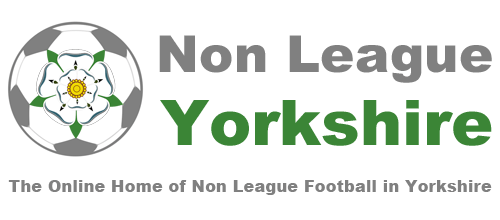
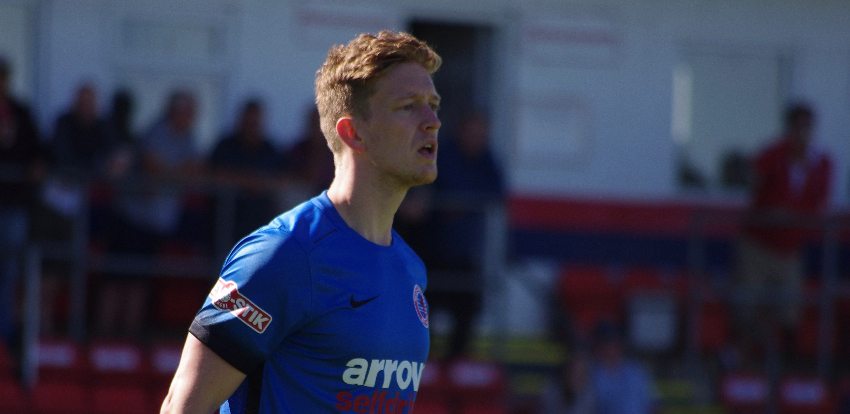
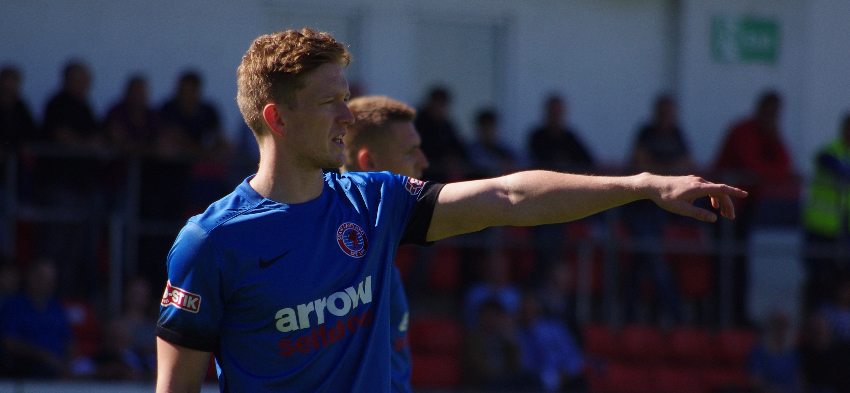
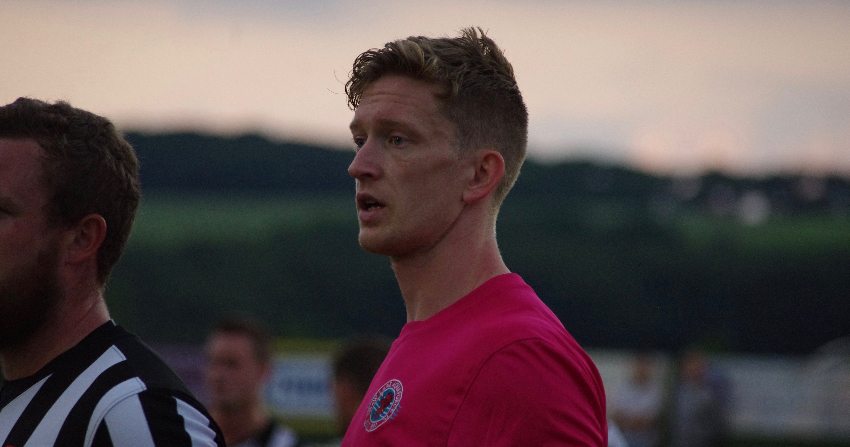
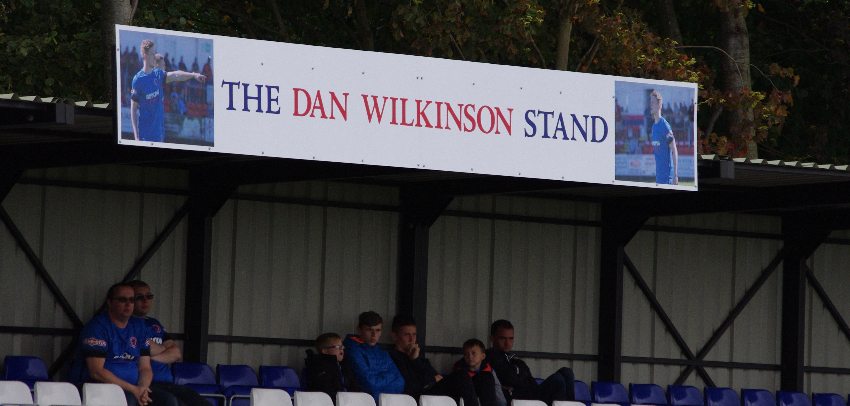
Enjoyed this article,